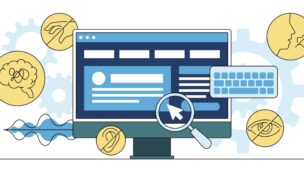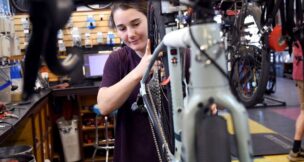GUEST COLUMN: CEO of arc Thrift Stores, Lloyd Lewis, Sees an ‘Hidden Crisis’ of Disability Rights
Exploring systemic barriers and the urgent need for enhanced civil rights protections for the Intellectual and Developmental Disabilities community.
Lloyd Lewis, president and CEO of arc Thrift Stores //May 9, 2024//


GUEST COLUMN: CEO of arc Thrift Stores, Lloyd Lewis, Sees an ‘Hidden Crisis’ of Disability Rights
Exploring systemic barriers and the urgent need for enhanced civil rights protections for the Intellectual and Developmental Disabilities community.
Lloyd Lewis, president and CEO of arc Thrift Stores //May 9, 2024//
In the bustling landscape of commerce and community, there exists a silent epidemic of discrimination and neglect: the systemic violation of civil rights for individuals with intellectual and developmental disabilities (IDD).
Behind the veneer of progress and prosperity lies a harsh reality where basic human rights are routinely denied, and opportunities are systematically withheld.
While society champions the ideals of diversity, equity, and inclusion (DEI), it turns a blind eye to the glaring injustices faced by those with disabilities. Despite legal protections and purported advancements, individuals with IDD are relegated to the shadows of neglect and indifference.
A personal and corporate commitment to change
I am the president and CEO of one of Colorado’s retail chains, which also happens to be one of the state’s largest nonprofits and employers of people with IDD. I am also the father of a young man with Down syndrome. My experiences have made me a fervent advocate for a marginalized population whose rights have been overlooked for far too long.
READ: Empowering Neurodiversity — The Competitive Edge in Workplace Loyalty and Reliability
Legal framework and societal challenges
The U.S. Constitution and federal laws and court decisions have established rights and protections for people with disabilities. However, despite the tremendous advances, these laws and regulations have limitations.
Moreover, poor enforcement of the laws, limited funding of programs, disregard for binding legal precedent and societal prejudices keep many people with disabilities from being fully included in our society.
When it comes to DEI, we think about being committed to not prejudicing someone based on race, gender or sexual orientation. It’s an important shift in our culture and it is well overdue. But we’re missing something. The “I” in DEI must be expanded.
Consider this: A staggering 80% of individuals with IDD in the United States are unemployed. This is a damning indictment of a society that values productivity over humanity.
Historical context and barriers
Throughout history, individuals with disabilities have faced egregious discrimination and exclusion. It wasn’t until relatively recently that significant strides were made toward recognizing and upholding their rights.
In 1990, the Americans with Disabilities Act was signed into law, prohibiting discrimination against individuals with disabilities in all areas of public life, including employment, education, transportation and public accommodations. This landmark legislation represented a crucial step toward achieving equality and inclusion for people with disabilities.
However, the reality starkly contradicts these principles.
People with disabilities continue to face systemic barriers that hinder their civil rights and their access to equal opportunities and full participation in society.
Consider the alarming fact that more than 250 bills restricting access to voting have been introduced in 43 states since the 2020 election. While many of these laws are intended to suppress the votes of people of color, they also disproportionately impact individuals with disabilities, further marginalizing a population that is already disenfranchised.
READ: Celebrating National Disability Employment Awareness Month — 7 Reasons to Embrace Neurodiversity in the Workplace
Advocacy for comprehensive civil rights
Equal access under the law is not just a lofty ideal — it is a cornerstone of our democracy.
Yet, individuals with disabilities often encounter obstacles when attempting to exercise their right to vote.
Polling places may lack necessary accommodations, such as wheelchair ramps or accessible voting machines, making it difficult or impossible for individuals with mobility impairments to cast their ballots.
Moreover, voter ID laws and inaccessible registration processes pose additional challenges for individuals with cognitive or sensory disabilities.
The barriers to equal access extend beyond the voting booth. In our education system, students with disabilities are frequently denied the accommodations and support they need to thrive. Instead of receiving the resources necessary to succeed, they are often subjected to exclusionary practices that undermine their educational opportunities and future prospects.
Similarly, in the criminal legal system, individuals with disabilities are disproportionately affected by policies and practices that violate their fundamental rights. Too often, they are denied access to necessary accommodations and support services, leading to unjust outcomes and perpetuating cycles of incarceration.
People with disabilities bear the burden of higher medical debt, grapple with increased rates of food insecurity, and are unjustly compensated with lower wages. And despite nearly five decades since schools opened their doors to developmentally disabled children, segregation persists.
People with disabilities are also more likely to experience violence, abuse and neglect and are disproportionately targeted by the criminal justice system, with studies showing that they are more likely to be arrested and incarcerated than their nondisabled peers.
Disabled adults face poverty at more than twice the rate of their non-disabled counterparts, and nearly a quarter of the half a million individuals experiencing homelessness in our country have a disability.
READ: Embracing Neurodiversity in the Workplace — 5 Benefits of Hiring Neurodiverse Talent
A call to redefine civil rights and inclusion
These statistics are more than just alarming; they are a glaring indicator of systemic failure.
This isn’t merely a DEI issue; it’s a civil rights issue.
And, when you consider that currently there are over 6 million people in the U.S. with IDD (200 million globally), this is unacceptable. It is time to confront these injustices head-on and demand meaningful change.
At arc Thrift Stores, we’ve witnessed the transformative power of inclusivity firsthand. Our success story stands as a testament to the untapped potential and invaluable contributions of individuals with disabilities.
To truly dismantle the barriers to disability rights, we must confront the pervasive stereotypes that perpetuate discrimination and exclusion. By redefining civil rights to include individuals with IDD and prioritizing inclusivity, we can pave the way for a more just and equitable society.
Let us not forget the most vulnerable among us. Let us stand in solidarity with individuals with disabilities as we strive to build a world where everyone has the opportunity to thrive.
Lloyd Lewis is the president and CEO of one of Colorado’s largest nonprofits, arc Thrift Stores. Lewis, the father of a young man with Down syndrome, has been an invited speaker to the Anti-Defamation League, the Society for Nonprofits, and many other national organizations. He also sits on the board of The Arc of the United States Foundation and is treasurer of Inclusion International, a worldwide organization advocating for people with intellectual and developmental disabilities, with members in over 100 countries.
t
























